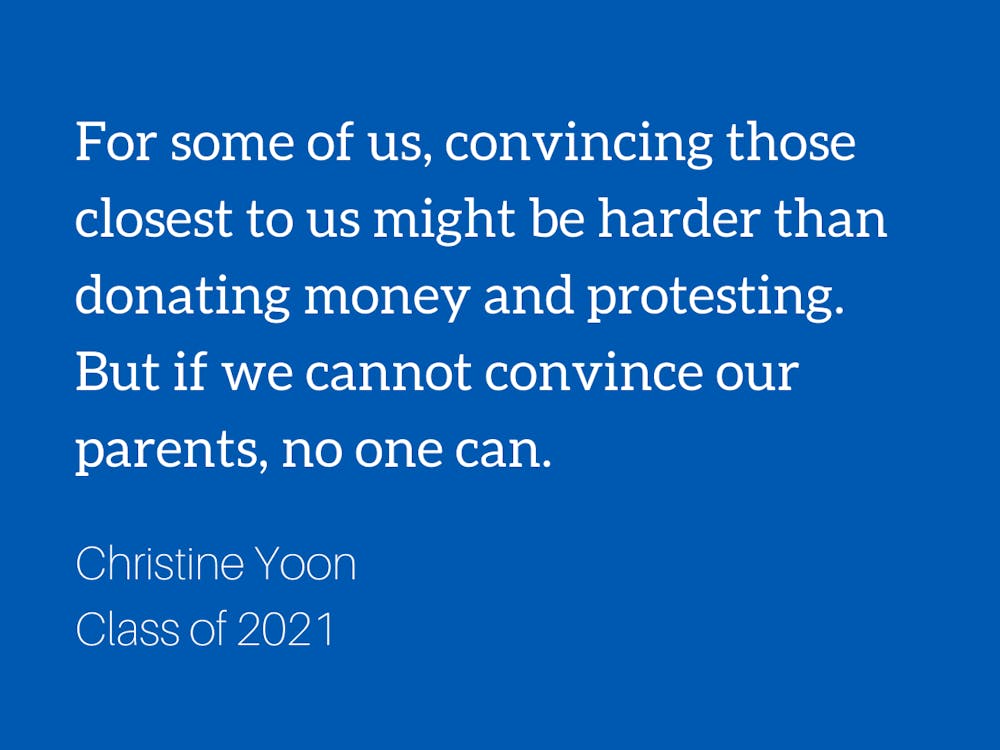In the wake of the killings of George Floyd, Tony McDade, Ahmaud Arbery, Breonna Taylor and other Black victims at the hands of the police and racist perpetrators, NYU’s Lambda Phi Epsilon, the Asian-interest community, has shown complete disdain for the Black community through its racist GroupMe messages that leaked to Twitter. At the same time, some of my upper-middle class Asian neighbors in my town on Long Island, N.Y., have expressed anti-Black sentiment as they feared the local luxury boutiques and their own businesses would get looted. Their concerns about the repairable property damage and financial losses had morphed into racist hate speech and a complete disregard of the lost and irreplaceable Black lives that prompted these protests and riots.
Similarly insensitive and racist remarks by members of the Asian/American community have also permeated into social media and the Internet, including Asians in the Duke community. These individuals don’t represent the entire Asian American community, but it is undeniable that these indignities resulted from preexisting racism and colorism in the Asian American community.
While I commend my fellow Asian Americans who have been supporting the Black Lives Matter movement, it is clear that we still have some work to do to address the anti-Blackness within our community—in our families, friends and even ourselves. I am not denying that we still face discrimination today for being Asian in the United States, in apparently causing the “Chinese coronavirus,” lacking personality, et cetera.
Most of us, however, don’t need to be afraid of getting gunned down or choked to death when we walk down the streets, jog outside, sleep in our beds at home, go shopping, et cetera. This is the case for our Black friends and neighbors, who make up 24% of police killings despite being only 13% of the United States population. As Asian Americans, we need to stand up for our Black friends, classmates and neighbors, not only out of basic human decency but also because the Black community helped us obtain our civil rights that continue to benefit us today.
Much of the foundation of America was built from the slave labor of Black people who were brought to this country against their will and used for profit, including our profit. After the abolition of slavery, Black Americans continued to struggle as they built up their community on their own while dealing with institutional racism and constant threats that have continued through to today. In our own history as Asian Americans, we have also struggled in the face of the Chinese Exclusion Act, the Chinese Massacre of 1871, Japanese internment and countless other crimes against us that we will never forget.
Since then, Black activists have started movements and fought for rights that have benefited not only Black Americans but also Asian Americans, Latinx people, Native Americans, women and LGBTQ people as well. For instance, the Civil Rights Movement of the 1960s, led by African American civil rights groups, had inspired Asian Americans to take action in their struggle for equality. Black and Asian American figures such as Malcolm X and Yuri Kochiyama, and James and Grace Lee Boggs worked side-by-side to pave the way for the rights we enjoy today. Because of this Black activist-led action, we saw the passing of the Immigration and Nationality Act of 1965, which lifted restrictions on immigrants to the United States, benefitting Asians such as my parents. The civil rights movement also overturned anti-miscegenation laws and later led to open admissions at institutions for higher education that benefit Asians today. As a result of this legacy, I have the incredible privilege of being a 1.5-generation Korean American attending Duke University.
As Asian Americans, we owe the Black community for leading the way and fighting alongside us to allow us the rights we have today. We must support Black Lives Matter and spread the word to other Asian Americans in order to combat the anti-Black racism that is prevalent in our country and communities. We should start from home and confront our communities about how our anti-blackness and colorism harms the Black community and why we should support the Black Lives Matter movement. For some of us, convincing those closest to us might be harder than donating money and protesting. But if we cannot convince our parents, no one can, and we will perpetuate the racism and colorism that is prevalent in our homes and communities. The Letters for Black Lives and Resources for non-Black Asians on Anti-Blackness are excellent resources to get started, which have educational resources and template letters translated in 26 languages, including Bangla, Burmese, Chinese (Simplified), Chinese (Traditional), Farsi, Hmong, Indonesian, Japanese, Khmer, Korean, Lao, Nepali and Tagalog.
Besides talking to our communities, we should donate to organizations dedicated to Black community empowerment and criminal justice reform, get involved with political activism such as calling our local representatives and protesting, and call out the skin whitening, Black cultural appropriation, anti-affirmative action attitudes and other racist and colorist practices within our community. If we do not take action, we will be complicit with the racist policies that suppressed us decades ago and continue to suppress Black Americans today.
Christine Yoon is a Trinity senior.
Get The Chronicle straight to your inbox
Sign up for our weekly newsletter. Cancel at any time.

